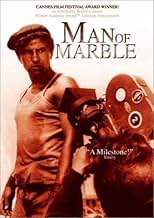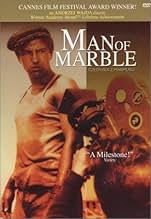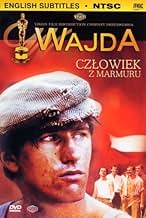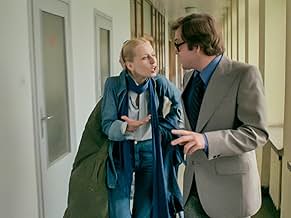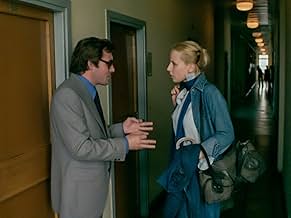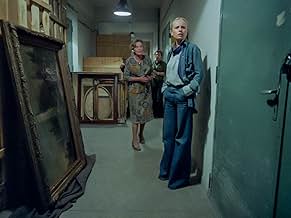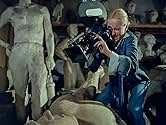NOTE IMDb
7,7/10
5,1 k
MA NOTE
Un jeune cinéaste polonais cherche à savoir ce qu'il est advenu de Mateusz Birkut, un maçon qui est devenu un héros de la propagande dans les années 1950, mais qui est ensuite tombé en disgr... Tout lireUn jeune cinéaste polonais cherche à savoir ce qu'il est advenu de Mateusz Birkut, un maçon qui est devenu un héros de la propagande dans les années 1950, mais qui est ensuite tombé en disgrâce et a disparu.Un jeune cinéaste polonais cherche à savoir ce qu'il est advenu de Mateusz Birkut, un maçon qui est devenu un héros de la propagande dans les années 1950, mais qui est ensuite tombé en disgrâce et a disparu.
- Réalisation
- Scénario
- Casting principal
- Récompenses
- 4 victoires et 1 nomination au total
Avis à la une
Wajda's MAN OF MARBLE is one of the most compelling attacks on government corruption that I have ever seen. It is a "Citizen Kane"-styled story of a female film student who tries to trace the history of Birkut, a long-forgotten "hero" of the Polish Communist government.
She begins by viewing propaganda film that praises Birkut as a devout worker who slaves away at brick-laying for the officials. He has the appearance of a vigilant, Hercules-like strongman who breezes through the labor without breaking a sweat. Then she goes to interview the director, who was hired by the government. He tells her about the reality of making the film, such as how Birkut was given extra food and water (unlike the other bricklayers). Wajda uses these two conflicting scenes to deconstruct the false imagery that propaganda gives its viewers. He shows us how officials manipulate such situations to their own political good.
The student goes on to interview other subjects who describe the brutal reality of Birkut's off-camera existence. In one devastating scene, she meets his wife, who breaks down and tries to avoid being interviewed. As the truth becomes clearer and clearer, the government begins to intercede in the production of the student's film.
Wajda was a film-maker who was not afraid to criticize the harsh Polish government that eventually was defeated by individuals such as Lech Walesa. MAN OF MARBLE is a testament to those who had to live through the oppression of Communism, and also to those who are still living under its iron fist.
She begins by viewing propaganda film that praises Birkut as a devout worker who slaves away at brick-laying for the officials. He has the appearance of a vigilant, Hercules-like strongman who breezes through the labor without breaking a sweat. Then she goes to interview the director, who was hired by the government. He tells her about the reality of making the film, such as how Birkut was given extra food and water (unlike the other bricklayers). Wajda uses these two conflicting scenes to deconstruct the false imagery that propaganda gives its viewers. He shows us how officials manipulate such situations to their own political good.
The student goes on to interview other subjects who describe the brutal reality of Birkut's off-camera existence. In one devastating scene, she meets his wife, who breaks down and tries to avoid being interviewed. As the truth becomes clearer and clearer, the government begins to intercede in the production of the student's film.
Wajda was a film-maker who was not afraid to criticize the harsh Polish government that eventually was defeated by individuals such as Lech Walesa. MAN OF MARBLE is a testament to those who had to live through the oppression of Communism, and also to those who are still living under its iron fist.
I first learned of Andrzej Wajda when he won an honorary Academy Award and made his acceptance speech in his native Polish. In the years since, I've watched some of his movies. I've finally seen his "Czlowiek z marmuru" ("Man of Marble" in English). It focuses on a filmmaker (Krystyna Janda) putting together a production about a man (Jerzy Radziwilowicz) who got held up as the paradigm of a heroic Stakhanovite but whose whereabouts are now unknown. Then of course arises the issue of how much she'll be allowed to focus on this man without angering the authorities.
It's safe to say that this movie presaged the rise of the Solidarity movement in its depiction of the workers. Wajda was already inclined to direct independently of the government's confines, and he became one of the most innovative directors of all, along the lines of Stanley Kubrick and Federico Fellini. In the end, this is one that you have to see. I hope to see more of Wajda's movies.
It's safe to say that this movie presaged the rise of the Solidarity movement in its depiction of the workers. Wajda was already inclined to direct independently of the government's confines, and he became one of the most innovative directors of all, along the lines of Stanley Kubrick and Federico Fellini. In the end, this is one that you have to see. I hope to see more of Wajda's movies.
Ironic, tongue-in-cheek, smart and a tad too long, "Man of Marble" is a good movie that can't help being a little bit too much in love with itself, on top of being unable to know where to stop, thus ending being a little bit repetitive.
Agnieszka, a university student doing her diploma film, decides to investigate in the past of long forgotten hero of the people Birkut. Her search brings her to discover a lot about a man that was put in a pedestal to then be forgotten and erased from the history of the nation.
Wajda does not use a lot of subtlety in this film, but who needs it when the script is smart enough, the direction top notch, with some great shots and a pace that is sometimes close to an action movie, and there is really good acting (in particular our hero, Agnieszka, played with a lot of sass and confidence by Krystyna Janda). The score and the use of locations is also great.
However, the movie clocks at over two hours and a half, and the ideas behind the movie: the use of unknown people by the ones in power as little more than toys, destroying lives and dreams without a second of remorse, the difficulty to fight the system or the way paranoia extends everywhere in some regimes become undone by repetition and by a story that starts to spin on its wheels around the 1 hour and a half mark.
It is totally worth checking though. Just be sure to have enough time (you may want to have some breaks).
Agnieszka, a university student doing her diploma film, decides to investigate in the past of long forgotten hero of the people Birkut. Her search brings her to discover a lot about a man that was put in a pedestal to then be forgotten and erased from the history of the nation.
Wajda does not use a lot of subtlety in this film, but who needs it when the script is smart enough, the direction top notch, with some great shots and a pace that is sometimes close to an action movie, and there is really good acting (in particular our hero, Agnieszka, played with a lot of sass and confidence by Krystyna Janda). The score and the use of locations is also great.
However, the movie clocks at over two hours and a half, and the ideas behind the movie: the use of unknown people by the ones in power as little more than toys, destroying lives and dreams without a second of remorse, the difficulty to fight the system or the way paranoia extends everywhere in some regimes become undone by repetition and by a story that starts to spin on its wheels around the 1 hour and a half mark.
It is totally worth checking though. Just be sure to have enough time (you may want to have some breaks).
'Man of marble' is usually seen as an bold, anti-communist movie which is strikingly accurate at the deep level of practices within communist countries. Indeed, trough a story of a student who tries to make a graduation film Wajda beautifully succeeds in describing at the same time the soft violence of the '70s in Poland and the totally different hardcore 'prison' violence of the Stalinist regime in the 50's. Hence, it is gradually revealed trough the eye of the camera the contrast between the heroic, raw atmosphere of the first communist years and the light perestroika of the present cinematographic time. Nonetheless, there is a common thread throughout the movie as the all-pervading party monopoly deeply affects everybody and no one has the option of an Utopian escape.
The no exit strategy is probably for me the main theme of the movie. The rebellious young girl who tries to see beneath the propaganda images is also on psychoanalytical trip to confront her family history.
There are two scenes which can more or less summaries the story: in the first one, we can see her right at the beginning in a rough quarrel with her Television supervisor, and we can consequently grasp the theme of the incessant conflict with the authority. However, if on the one level wecan see her rejecting the father figure, on the second level we can witness desire as the film maker is practically possessing the hero statue which she finds in a basement of a museum.
Well, basically the catch of the movie is the intertwine of the story with the girl on the way of her desire and the political level which makes this trip also a trip of a historical clearing up. And, in the strange development of we find that the "fake" hero is in fact an authentic one and that we did know the secret of the narrative - the "hero"(the father, the phallus) of the propaganda is the "true" hero, as he had to face real tough moral problems and he lived "the life in truth" . The heroine can develop at last real emotional attachment with the paternal image and she eventually can end her trip by accepting an ally and a friend in the final scene.
The no exit strategy is probably for me the main theme of the movie. The rebellious young girl who tries to see beneath the propaganda images is also on psychoanalytical trip to confront her family history.
There are two scenes which can more or less summaries the story: in the first one, we can see her right at the beginning in a rough quarrel with her Television supervisor, and we can consequently grasp the theme of the incessant conflict with the authority. However, if on the one level wecan see her rejecting the father figure, on the second level we can witness desire as the film maker is practically possessing the hero statue which she finds in a basement of a museum.
Well, basically the catch of the movie is the intertwine of the story with the girl on the way of her desire and the political level which makes this trip also a trip of a historical clearing up. And, in the strange development of we find that the "fake" hero is in fact an authentic one and that we did know the secret of the narrative - the "hero"(the father, the phallus) of the propaganda is the "true" hero, as he had to face real tough moral problems and he lived "the life in truth" . The heroine can develop at last real emotional attachment with the paternal image and she eventually can end her trip by accepting an ally and a friend in the final scene.
Andrzej Wajda has always impressed me, and his war trilogy are among the best and most essential films in the history of cinema, but "Man of Marble" is an ambitious, interesting idea that isn't realized very well in script or in terms of the finished product.
The most interesting aspect of "Man of Marble" outside of the much-examined similarities to "Citizen Kane" is how subversive it is. I wonder how this was ever released in Poland at the time, and the scenes in the film where I felt Wajda really did succeed as a director is where he contrasts Soviet propaganda with the actual events- very powerful. Wajda fails more than he succeeds with this particular film though, it's a disjointed narrative and it takes tremendous skill to keep the audience interested in both stories. Sure, one may argue that "Man of Marble" isn't intended as entertainment, but even in the context of art-house cinema this film is only engaging in parts, with Agnieszka's attempt to make this film ending up far more interesting than the film she's making.
I can see where Wajda is going with the way he shot this film, but it just doesn't work very well, and the score for this film has to be one of the worst matches I've ever come across. It's ludicrous.
Something of a companion piece by the same writer and director, I found "Man of Iron" far more engaging and impressive.
5/10
The most interesting aspect of "Man of Marble" outside of the much-examined similarities to "Citizen Kane" is how subversive it is. I wonder how this was ever released in Poland at the time, and the scenes in the film where I felt Wajda really did succeed as a director is where he contrasts Soviet propaganda with the actual events- very powerful. Wajda fails more than he succeeds with this particular film though, it's a disjointed narrative and it takes tremendous skill to keep the audience interested in both stories. Sure, one may argue that "Man of Marble" isn't intended as entertainment, but even in the context of art-house cinema this film is only engaging in parts, with Agnieszka's attempt to make this film ending up far more interesting than the film she's making.
I can see where Wajda is going with the way he shot this film, but it just doesn't work very well, and the score for this film has to be one of the worst matches I've ever come across. It's ludicrous.
Something of a companion piece by the same writer and director, I found "Man of Iron" far more engaging and impressive.
5/10
Le saviez-vous
- AnecdotesThe award Burski is flaunting at the airport on his return was Wajda's own award, hence Burski is a mock self-portrait.
- ConnexionsEdited into Sauve la vie (qui peut) (1981)
Meilleurs choix
Connectez-vous pour évaluer et suivre la liste de favoris afin de recevoir des recommandations personnalisées
- How long is Man of Marble?Alimenté par Alexa
Détails
- Durée
- 2h 45min(165 min)
- Couleur
- Mixage
- Rapport de forme
- 1.37 : 1
Contribuer à cette page
Suggérer une modification ou ajouter du contenu manquant


